Health Labels for Cigars, Pipe Tobacco and Other Tobacco Products
The new requirements under the Tobacco Products Appearance, Packaging and Labelling Regulations will come into force on August 1, 2023. During the transition period from August 1, 2023 to April 30, 2024, health-related messages from both the new regulations and existing regulations may be seen on tobacco products and packages.
The new health-related messages will be made available on the web by August 1, 2023. In the interim, please contact pregs@hc-sc.gc.ca to request the new health-related messages.
The Tobacco Products Information Regulations stipulate labelling requirements for tobacco products such as kreteks, bidis, cigarette tobacco, leaf tobacco, cigars, pipe tobacco and smokeless tobacco products. Depending on the type of product, the labelling requirements can include health warning messages, health information messages and/or toxic emissions and constituents. Text only health warning messages (not shown here) are required for smokeless tobacco products and bidis.
Labelling requirements for cigarettes and little cigars are found in the Tobacco Products Labelling Regulations (Cigarettes and Little Cigars).
Note: Health Canada is the copyright owner of all health label images with the exception of those marked with an asterisk (*). Reproducing any of these images without prior permission is prohibited. You can request permission to use the images owned by Health Canada by submitting this form. For those images whose copyright is not owned by Health Canada, that is those marked with an asterisk (*), please contact pregs@hc-sc.gc.ca to obtain the owner's contact information.
Health Warnings for Cigars and Pipe Tobacco

Description - WARNING - Where there's smoke, there's poison
Tobacco smoke contains more than 50 cancer-causing agents.
Health Canada

Description - WARNING - Tobacco use causes mouth diseases
Tobacco smoke causes oral cancer, gum diseases and tooth loss.
Health Canada
Health Warnings for Kreteks, Cigarette Tobacco, Leaf Tobacco and Tobacco Sticks

Description - WARNING - Cigarettes are highly addictive
Studies have shown that tobacco can be harder to quit than heroin or cocaine.
Health Canada

Description - WARNING - Children see. Children do.
Your children are twice as likely to smoke if you do. Half of all premature deaths among life-long smokers result from tobacco use.
Health Canada

Description - Don't poison us
WARNING: Second-hand smoke contains carbon monoxide, ammonia, formaldehyde, benzo[a]pyrene and nitrosamines. These chemicals can harm your children.
Tobacco smoke hurts children.
Health Canada

Description - WARNING - Tobacco smoke hurts babies
Tobacco use during pregnancy increases the risk of preterm birth. Babies born preterm are at an increased risk of infant death, illness and disability.
Health Canada

Description - WARNING - Each year, the equivalent of a small city dies from tobacco use
Estimated deaths in Canada, 1996
- Murders -- 510;
- Alcohol -- 1,900;
- Car accidents -- 2,900;
- Suicides -- 3,900;
- Tobacco -- 45,000
Health Canada

Description - WARNING - Cigarettes leave you breathless
Tobacco use causes crippling, often fatal lung diseases such as emphysema.
Health Canada

Description - WARNING - Cigarettes cause lung cancer
85% of lung cancers are caused by smoking. 80% of lung cancer victims die within three years.
Health Canada

Description - WARNING - Idle but deadly
Smoke from a lit cigarette contains toxic substances like hydrogen cyanide, formaldehyde and benzene. Second-hand smoke can cause death from lung cancer and other diseases.
Health Canada
Health Information Messages for Kreteks, Cigarette Tobacco, Leaf Tobacco and Tobacco Sticks
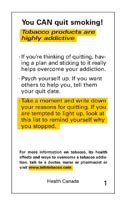
Description - You CAN quit smoking!
Tobacco products are highly addictive
- If you're thinking of quitting, having a plan and sticking to it really helps overcome your addiction.
- Psych yourself up. If you want others to help you, tell them your quit date.
- Take a moment and write down your reasons for quitting. If you are tempted to light up, look at this list to remind yourself why you stopped.
For more information on tobacco, its health effects and ways to overcome a tobacco addiction, talk to a doctor, nurse or pharmacist or visit www.infotobacco.com
Health Canada
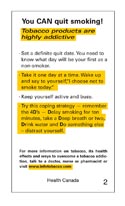
Description - You CAN quit smoking!
Tobacco products are highly addictive
- Set a definite quit date. You need to know what day will be your first as a non-smoker.
- Take it one day at a time. Wake up and say to yourself "I choose not to smoke today."
- Keep yourself active and busy.
- Try this coping strategy —remember the 4D's — Delay smoking for ten minutes, take a Deep breath or two, Drink water and Distract yourself.
For more info rmation on to b a c c o, its health effects and ways to overcome a tobacco addiction, talk to a doctor, nurse or pharmacist or visit www.infotobacco.com
Health Canada
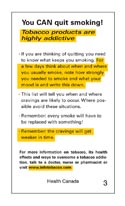
Description - You CAN quit smoking!
Tobacco products are highly addictive
- If you are thinking of quitting you need to know what keeps you smoking. For a few days think about when and where you usually smoke, note how strongly you needed to smoke and what your mood is and write this down.
- This list will tell you when and where cravings are likely to occur. Where possible avoid these situations.
- Remember: every smoke will have to be replaced with something!
- Remember: the cravings will get weaker in time.
For more information on tobacco, its health effects and ways to overcome a tobacco addiction, talk to a doctor, nurse or pharmacist or visit www.infotobacco.com
Health Canada
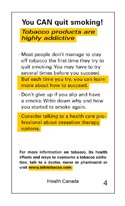
Description - You CAN quit smoking!
Tobacco products are highly addictive
- Most people don't manage to stay off tobacco the first time they try to quit smoking. You may have to try several times before you succeed. But each time you try, you can learn more about how to succeed.
- Don't give up if you slip and have a smoke. Write down why and how you started to smoke again.
- Consider talking to a health care professional about cessation therapy options.
For more information on tobacco, its health effects and ways to overcome a tobacco addiction, talk to a doctor, nurse or pharmacist or visit www.infotobacco.com
Health Canada
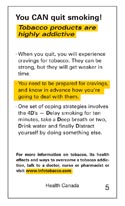
Description - You CAN quit smoking!
Tobacco products are highly addictive
- When you quit, you will experience cravings for tobacco. They can be strong, but they will get weaker in time.
- You need to be prepared for cravings, and know in advance how you're going to deal with them.
- One set of coping strategies involves the 4D's — Delay smoking for ten minutes, take a Deep breath or two, Drink water and finally Distract yourself by doing something else.
For more information on tobacco, its health effects and ways to overcome a tobacco addiction, talk to a doctor, nurse or pharmacist or visit www.infotobacco.com
Health Canada
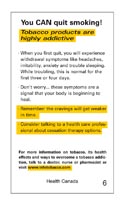
Description - You CAN quit smoking!
Tobacco products are highly addictive
- When you first quit, you will experience withdrawal symptoms like headaches, irritability, anxiety and trouble sleeping. While troubling, this is normal for the first three or four days.
- Don't worry... these symptoms are a signal that your body is beginning to heal.
- Remember: the cravings will get weaker in time.
- Consider talking to a health care professional about cessation therapy options.
For more information on tobacco, its health effects and ways to overcome a tobacco addiction, talk to a doctor, nurse or pharmacist or visit www.infotobacco.com
Health Canada

Description - You CAN quit smoking!
Tobacco products are highly addictive
- If you're thinking of quitting, you don't need to do it all on your own. Get your friends and family to help you. Tell them your quit date.
- Consider talking to a health care professional about cessation therapy options.
- You need to be prepared for cravings and know in advance how you are going to deal with them.
- Remember: the cravings will get weaker in time.
For more information on tobacco, its health effects and ways to overcome a tobacco addiction, talk to a doctor, nurse or pharmacist or visit www.infotobacco.com
Health Canada
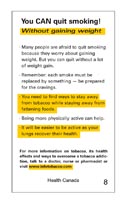
Description - You CAN quit smoking!
Without gaining weight
- Many people are afraid to quit smoking because they worry about gaining weight. But you can quit without a lot of weight gain.
- Remember: each smoke must be replaced by something — be prepared for the cravings.
- You need to find ways to stay away from tobacco while staying away from fattening foods.
- Being more physically active can help.
- It will be easier to be active as your lungs recover their health.
For more information on tobacco, its health effects and ways to overcome a tobacco addiction, talk to a doctor, nurse or pharmacist or visit www.infotobacco.com
Health Canada
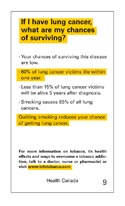
Description - If I have lung cancer, what are my chances of surviving?
- Your chances of surviving this disease are low.
- 60% of lung cancer victims die within one year.
- Less than 15% of lung cancer victims will be alive 5 years after diagnosis.
- Smoking causes 85% of all lung cancers.
Quitting smoking reduces your chance of getting lung cancer.
For more information on tobacco, its health effects and ways to overcome a tobacco addiction, talk to a doctor, nurse or pharmacist or visit www.infotobacco.com
Health Canada

Description - Can second-hand smoke harm my family?
- Yes.
- The smoke from the burning tip of your tobacco product and the smoke you exhale are dangerous. They can harm your family, especially your children.
- Children who breathe second-hand smoke suffer more chest infections, bronchitis, ear infections and asthma attacks.
- Second-hand smoke also contributes to death from lung cancer in non-smoking adults.
The best solution is to stop smoking. If you do smoke, smoke outside!
For more information on tobacco, its health effects and ways to overcome a tobacco addiction, talk to a doctor, nurse or pharmacist or visit www.infotobacco.com
Health Canada
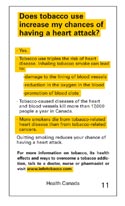
Description - Does tobacco use increase my chances of having a heart attack?
- Yes.
- Tobacco use triples the risk of heart disease. Inhaling tobacco smoke can lead to:
- damage to the lining of blood vessels
- reduction in oxygen in the blood
- promotion of blood clots
- Tobacco-caused diseases of the heart and blood vessels kill more than 17,000 people a year in Canada.
- More smokers die from tobacco-related heart disease than from tobacco related cancers.
Quitting smoking reduces your chance of having a heart attack.
For more information on tobacco, its health effects and ways to overcome a tobacco addiction, talk to a doctor, nurse or pharmacist or visit www.infotobacco.com
Health Canada
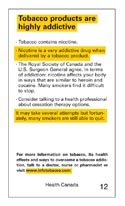
Description - Tobacco products are highly addictive
- Tobacco contains nicotine.
- Nicotine is a very addictive drug when delivered by a tobacco product.
- The Royal Society of Canada and the U.S. Surgeon General agree. In terms of addiction: nicotine affects your body in ways that are similar to heroin and cocaine. Many smokers find it difficult to stop.
- Consider talking to a health professional about cessation therapy options. It may take several attempts but fortunately, many smokers are still able to quit.
For more information on tobacco, its health effects and ways to overcome a tobacco addiction, talk to a doctor, nurse or pharmacist or visit www.infotobacco.com
Health Canada

Description - Can tobacco cause brain injury?
- Yes, it can result in brain injury.
- Tobacco damages blood vessels and causes blood clots in the blood vessels of the brain. This causes strokes.
- Strokes often result in extreme disability, including paralysis and loss of speech. Strokes can also result in death.
- More than 2,500 people in Canada die each year from tobacco-caused strokes.
Quitting smoking reduces your chance of having a stroke.
For more information on tobacco, its health effects and ways to overcome a tobacco addiction, talk to a doctor, nurse or pharmacist or visit www.infotobacco.com
Health Canada
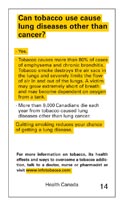
Description - Can tobacco use cause lung diseases other than cancer?
- Yes.
- Tobacco causes more than 80% of cases of emphysema and chronic bronchitis. Tobacco smoke destroys the air sacs in the lungs and severely limits the flow of air in and out of the lungs. A victim may grow extremely short of breath and may become dependent on oxygen from a tank.
- More than 9,000 Canadians die each year from tobacco-caused lung diseases other than lung cancer.
Quitting smoking reduces your chance of getting a lung disease.
For more information on tobacco, its health effects and ways to overcome a tobacco addiction, talk to a doctor, nurse or pharmacist or visit www.infotobacco.com
Health Canada
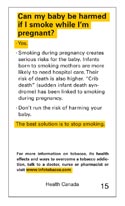
Description - Can my baby be harmed if I smoke while I'm pregnant?
- Yes.
- Smoking during pregnancy creates serious risks for the baby. Infants born to smoking mothers are more likely to need hospital care. Their risk of death is also higher. "Crib death" (sudden infant death syndrome) has been linked to smoking during pregnancy.
- Don't run the risk of harming your baby.
The best solution is to stop smoking.
For more information on tobacco, its health effects and ways to overcome a tobacco addiction, talk to a doctor, nurse or pharmacist or visit www.infotobacco.com
Health Canada
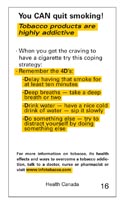
Description - You CAN quit smoking!
Tobacco products are highly addictive
- When you get the craving to have a cigarette try this coping strategy:
- Remember the 4D's:
- Delay having that smoke for at least ten minutes
- Deep breaths — take a deep breath or two
- Drink water — have a nice cold drink of water — sip it slowly
- Do something else — try to distract yourself by doing something else
- Remember the 4D's:
For more information on tobacco, its health effects and ways to overcome a tobacco addiction, talk to a doctor, nurse or pharmacist or visit www.infotobacco.com
Health Canada









